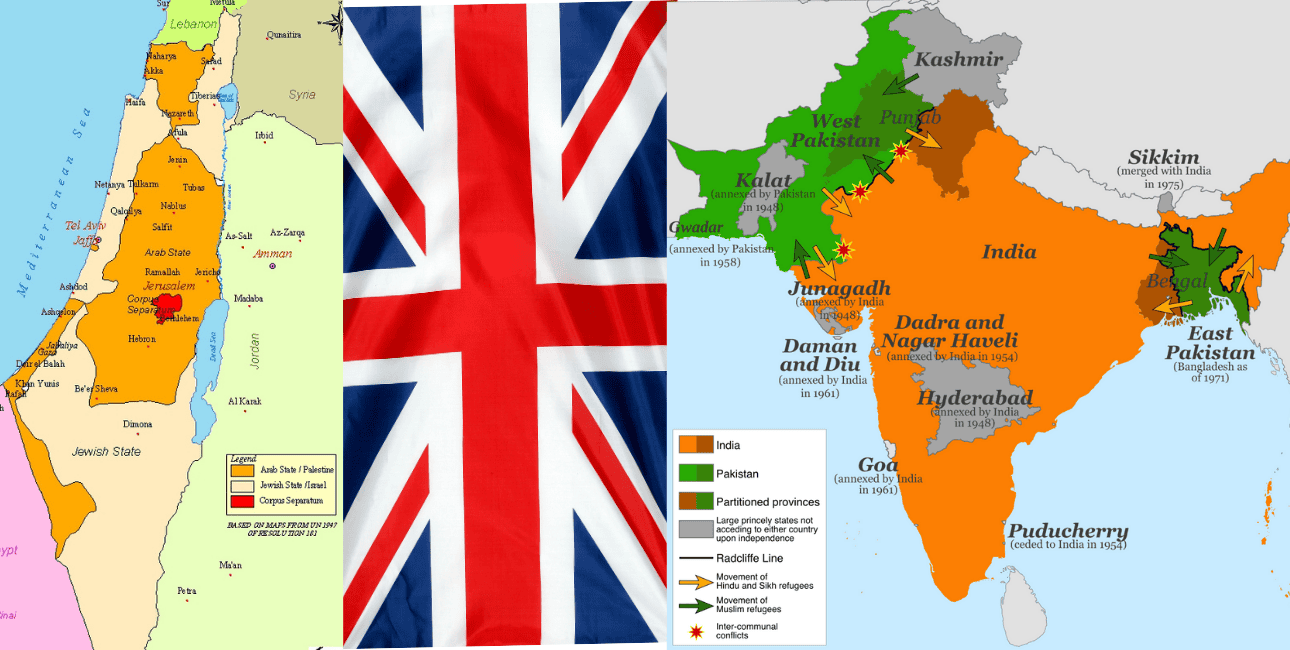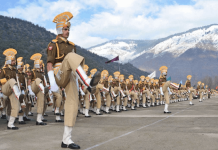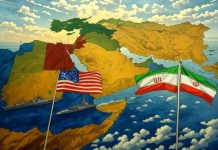In international politics, Israel and Pakistan are hardly ever on the same page. Pakistan has never officially recognized the state of Israel, and all Pakistani passports include the inscription that the document is valid for travel to all countries around the world, except Israel.
Pakistan has consistently voted against Israel in the United Nations, and some of the harshest critics of Israeli policies in Gaza are Pakistanis. Within Pakistan, demonstrations against Israel are a routine affair, and fundamentalists often accuse Tel Aviv of leading an international Jewish-Hindu alliance against the Muslim Ummah.
Having gained an independent homeland for Muslims through the British partition of the Indian subcontinent, Pakistan opposed the idea of creating a Jewish state in Palestine and voted against the partition plan for Palestine via the United Nations Special Committee on Palestine.
Since then, Pakistan has consistently tried to delegitimize the state of Israel.
Some of the arguments used in Islamabad to delegitimize the existence of Israel are as follows: Israel is, and has always been, a colonial enterprise; the founding of Israel was the result of decades of British policy of ‘divide and rule’ to weaken the local anti-colonial freedom movement. Besides, a nation-state created explicitly in the name of one religion can never be secular or even fair to its religious minorities.
Further, Pakistanis argue, Israel is founded on the land stolen from Palestinians, and if it were not for the haughty days of British imperialism, a fraud like Israel could never have materialized.
However, what is most intriguing is that Islamabad either does not realize or does not seem to care how all these arguments could be utilized to question and delegitimize their own state of Pakistan.
Notwithstanding Pakistan’s historical and consistent opposition to the existence of the state of Israel, Tel Aviv is Islamabad’s closest ‘ideological twin.’ Pakistan and Israel share more than passing similarities in their founding and organizing principles.
Pakistan Is Israel’s Closest Ideological Twin
Created within a year of each other (Pakistan in 1947 and Israel in 1948), no two states in the whole world so aptly defy all modern definitions of nationhood, crafted as both of them were, solely for the people of one religion, supposedly in ‘danger.’
Both movements started as abstract ideas, later appropriated by British imperialism for its own benefit. Both cater to the fears and insecurities of one particular religious community spread over a vast, heterogeneous land mass: Muslims in India and Jews in Europe.
Pakistan, as an idea, represented a homeland for Muslims of South Asia and Israel, a homeland for the Jews of Europe and the Middle East.

What justified their claims to nationhood was neither the continuous historic right to a common land or territory, nor membership in a blood-based community, but the mere fact of belonging to a shared religion: Islam in Pakistan and Judaism in the case of Israel.
In doing so, every learning of the post-enlightenment world was thrown out of the window, for it needs no stressing that neither the Muslims of the Indian subcontinent, nor the Jews spread over a multitude of European countries, were a homogeneous group.
They shared neither a common language nor shared traditions. Yet, it was believed that these widely dispersed communities could be ghettoized in a common territory, molded into a nationality, and given a common purpose.
Israel And Pakistan: Separated At Birth, United In Sectarian Divisions
These internal contradictions of language, ethnicity, and culture were a hindrance not only in the establishment of the Pakistani and Israeli states but also played a critical sectarian role in their subsequent evolution.
In Europe, the Zionist idea was championed by Ashkenazi Jews, i.e, Jews from Eastern Europe, and not the Arab Jews who are often referred to as Mizrahi.
The Ashkenazi Jews often looked down upon Mizrahi Jews and considered them less civilized, though one small step higher on the social scale than Israeli Palestinians.
After Israel was founded in 1948, Ashkenazi Jews monopolized all political power. The Labor Party elite, which ruled Israel uninterruptedly from 1948 to 1977, was overwhelmingly composed of Ashkenazi Jews. It was only in 1977 that the Likud party, which gave greater representation to Mizrahi Jews, came to power.
A striking similarity can be observed in Pakistan’s historical development. The idea was championed not in Punjab or Sindh, where Pakistan was eventually established, but in the United Provinces.
Also, while Pakistan was established for the Muslims of South Asia, all political and military power was cornered by Punjabi Muslims, who had little sympathy or respect for the language, culture, or aspirations of their Bengali Muslim brethren.
In Israel, the democratic structure was strong enough to ensure a peaceful transition of political power to Mizrahi Jews, but in Pakistan, the lack of a robust democracy closed the avenues for a peaceful transition of political power to the majority Bengali Muslims.
That was so till 1971, when constant suppression at the hands of Punjabi Muslims led to the Bangladesh War of Independence.
The Invisible Hand Of British Imperialism
A few more similarities between Pakistan and Israel are worth noting. Both were created under the aegis of British imperialism.
Indeed, despite the Second World War, the decade of 1940 represented the heyday of imperialism, when colonial masters sat at their high tables with cigars and maps, drawing the boundaries of nation-states.
In the process, an ancient civilization like India, which had existed for thousands of years, was partitioned.
More Jews In Palestine Than Muslims In India
Another critical similarity can be found in the demographics of pre-partition Palestine and India. Fortunately, we have reliable statistics on the demographics of both these places before their partition in 1947 and 1948.
According to a United Nations paper on the pre-1947 population of Palestine, on December 31st, 1946, the total Palestinian population was estimated to be 18,45,560, of which 10,76,780 (58.3 percent) were Muslims, 6,08,230 (32.95 percent) were Jews, 1,45,060 (7.85 percent) were Christians, and some 15,000 people belonged to other religions.
Separately, a 1945 Village Statistics report prepared by the British Mandate Government for Historic Palestine found the Jewish population in Palestine to be little over 31 percent.
So, by all accounts, it can be safely concluded that before the partition of Palestine in 1948, the Jewish population was over 30 percent and perhaps around one-third of the total Palestinian population.
Compare this to the Muslim population in British India.
India’s last census before partition was conducted in 1941. It estimated the Muslim population to be 27.09 percent in British-administered provinces and 14.22 percent in the 500-odd princely states. Taken as a whole, the Muslim population in pre-partition India was a little more than 24 percent, or roughly one-fourth of the total population.
Indeed, Jewish population in Palestine increased dramatically due to the Zionist movement in late 19th and early 20th century and also due to the unprecedented Jewish persecution in Europe under Nazi regime.
Still, it remains an undeniable fact that in the 1940s, there was a larger Jewish population in Palestine than there was a Muslim population in India.
So, if safeguarding the cultural and religious identity of a large minority by partitioning a diverse land was the argument, then Jews in Palestine had a stronger claim for a separate Jewish country than Muslims in India.
Pakistan’s Journey: From An Abstract Idea To Reality
Pakistan as an idea came into existence only a few years before India’s partition. On January 28, 1933, a law student at Cambridge University used the term ‘Pakistan’ for the first time to describe the “Muslim homelands” of western and northern India.
In the four-page booklet “Now or Never,” Chaudhary Rahmat Ali mentioned Pakistan for the first time. Seven years later, the Muslim League, in its Lahore session of 1940, officially accepted the demand for Pakistan as a separate country for the Muslims of India. Seven years later, under British colonial aegis, this fleeting fantasy became a reality.
In the annals of history, one will be hard-pressed to find any other parallel where the idea of a nation became reality within two decades.
By contrast, the idea of Israel had a long and distinguished pedigree. Even if one is to reject the existence of an Israeli state before the common era (mentioned in The Old Testament), no one can deny that even in modern times, the idea of Israel as a separate country for the Jews of the whole world was in existence for at least half a century before it came in existence.
The Austro-Hungarian Jewish journalist, Theodor Herzl, is considered to be the father of modern political Zionism, which ultimately led to the establishment of Israel. In 1896, he wrote his seminal book, Der Judenstaat, which laid the foundation for the Zionist movement in the years that followed.
Transition Of Indian Muslims: From Ruling Class To Insecure Minority
However, there were also some marked dissimilarities between the demand for Israel and Pakistan.
Jews in Europe had faced systematic ghettoization and persecution for hundreds of years that attained genocidal proportions under the Nazi regime. The demand for a Jewish state was the cry for the very survival of the Jewish people and their identity.
Contrast this to the position of Muslims in India, who, prior to the coming of the Britishers, were the ruling class in India for many centuries.
The demand for Pakistan was not a cry for the very survival of Muslim identity in India, rather a calculated political movement to safeguard the interests of Muslim nobility, who loathed losing political muscle in a democratic system.
Conclusion
In its dying days, British imperialism created for the world two lasting conflicts: The Israel-Palestine conflict and the India-Pakistan conflict.
However, it is indeed perplexing how Pakistan can continue to demand Kashmir, under the same ‘two-nation theory,’ and yet question the existence of Israel at the same time.
Islamabad must understand that when it questions Israel’s right to exist, it questions its own existence as well.
- Sumit Ahlawat has over a decade of experience in news media. He has worked with Press Trust of India, Times Now, Zee News, Economic Times, and Microsoft News. He holds a Master’s Degree in International Media and Modern History from the University of Sheffield, UK.
- VIEWS PERSONAL OF THE AUTHOR.
- He can be reached at ahlawat.sumit85 (at) gmail.com




